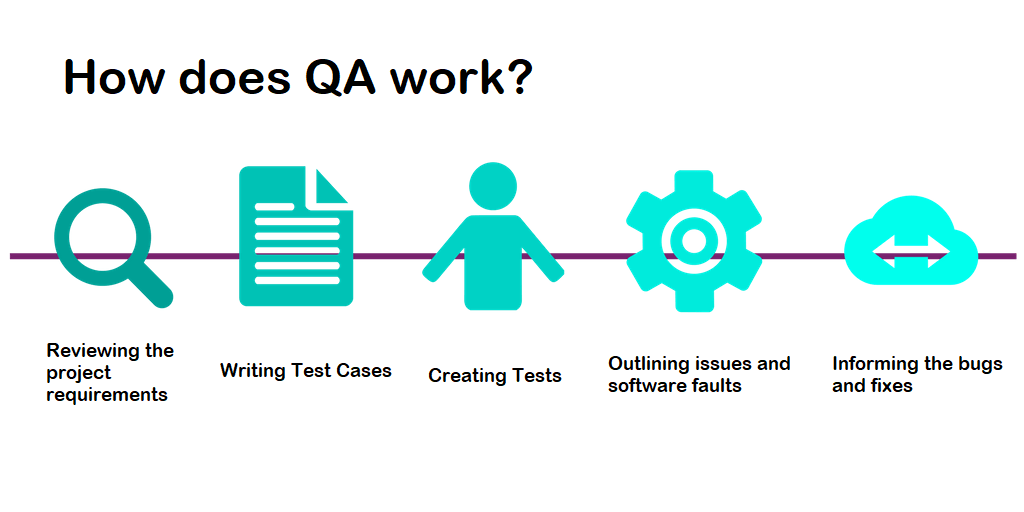In the technology-driven era, users prefer convenience over complexity. That is the fact, and we all are aware of it. When a startup or an entrepreneur creates a MindMap of his dream software it is free of errors and bugs. They understand that any mobile application or website user will always look for user-friendly and productive features.
Developing the software is not easier this way. Throughout the software development life cycle, developers go through many complications and errors which result in inconsistent and defective software.
Have you ever thought, what if the developed products launched for end users without testing? What if the developed product does not function poorly? What if the software has a lot of bugs?
If it happens, that you develop software and launch an untested software, then rather than acquiring new users, you will start losing your existing customers also. A lot of bugs lead to software crashing, which annoys users, and because of this most of the users either uninstall or stop using your software.
Real-life software Breakdowns
Before discussing the need for a QA analyzer, here are some real-life software breakdowns due to improper product development processes.
In the year 2015, Starbucks was hit by a major computer failure which caused the loss of millions in sales at stores in the U.S. and Canada. Coffee shops were compelled to offer free drinks till the time systems were fixed and refreshed.
In the year 2020, Juspay underwent a data breach that affected 35 million Juspay customers, a report says. The stolen information was being disposed of to the dark web. The data consists of name, bank name, and mobile number.
This explains how software failure can lead to major loss and can be worse than trivial bugs or unsuitable designs. Thus, Quality Assurance should be majorly focused on to avoid such major loss. Quality assurance testers play an important role in building a confident and user-friendly product.
At GraffersID: Web and App Development Company, we provide specialized QA testing services, using automation tools and technologies to develop a bug-free, secure, and smoothly performing software product.
Our QA engineers are hired not only for testing and bug-fixing but they mainly focus on preventing the flaws and ensuring the qualitative software development process. We understand how a quality software product is important for your business growth.
Collectively, we know that digital product quality is significant for an organization. To keep track of the platform’s performance and security, it is important to be mindful of your product’s efficiency.
What is QA Testing in software development?
- What is QA
- Other Aspects of QA Testing
- Types of QA testing
QA Testing is the process of preventing your software from bugs, and unwanted issues to ensure the smooth functioning of the product. Once the product is fully developed, the QA testing is done to make sure of the quality process from the end to the beginning of the development process.
But, it is much more than that, it is significant in building relations with the client, making your business reputation in the market. It provides customer satisfaction by fulfilling their requirements.
QA Testing is an essential process for every project to make it a successful one. It is an efficient and cost-effective process by identifying errors in the initial.
QA Testing’s can be performed in two ways:
- Manual Testing:
Where the tester analyzes all the essential features of the software product and creates test cases for the same based on which test reports are made. These tasks are performed manually without using any tools. - Automated Testing:
Where testers write codes for tests and use automation tools for testing and validating the software.
Is a Quality Assurance Tester Needed for Development?

- Why is a QA tester needed?
- What do they do?
Quality Assurance Tester plays a significant role in developing any application. In the former stage of application development, final users feel inconvenienced while using the product.
Therefore, the QA Testers’ role is to focus on improving the development process and averting errors or improper functionality.
The QA Tester performs various functions like testing, tuning, and debugging. Mainly, they focus on product matching the product requirements, solving errors if any, planning the tests, and analyzing the issues and software defects.
Thus, the reason why QA testers are needed for development is unavoidable. They sometimes become developers and use specific tools to check and fix the bugs for quality and error-free products.
Looking for vetted remote developers? Connect with us now!
How does QA Work?
Process

During the Quality Assurance, process developers go through several steps of planning different methods for assuring high-quality products.
-
Reviewing the project requirements:
The QA team will thoroughly go through the project’s requirements and software specifications to know the functional and non-functional features of the software.
-
Writing Test Cases:
Based on the requirements of your software development project, QA Tester prepares test cases for the same.
-
Creating Tests
Once the test cases are written, the QA Team will create tests in the required areas. It helps in improving your software quality.
-
Outlining issues and software faults
After the tests are developed, the QA team informs the developers about the issues so that they can make adjustments accordingly.
-
Iteration of tests
QA team can repeat the testing after all the corrections are made. This is done to confirm that no further issues can be seen and the software will smoothly function.
-
Informing the bugs and fixes
QA team will document the testing process and make sure to improve the quality of the software development process. They will come to know what tests are being performed, what are issues generated, what steps are being taken for correction, and what are the results of testing.
Quality Assurance Testing – Above and Beyond software’s bug-fixing
Over and above correcting software faults, Quality Assurance testing determines the quality standards and instruments the required mechanism to meet the needs and standards of the final product.
Before moving on to the process of developing a software product, associations need to document the qualitative requirements for understanding the customer’s quality experiences because all in all, end-users fall for a qualitative product.
Besides the essential need of managing and fixing errors, the quality goals of a product are equally significant. Because things that do not assist customers’ needs are abandoned and referred to as ‘defective’ pieces.
Why is the Quality Assurance Tester important in the team?
- What the QA team does
- With whom they work
- Why QA team important
A Quality Assurance Tester in your software development Team is essential before deploying the product. They hold the responsibility of delivering better quality and authentic products to the customers. The QA team is a vital part of the development process from the very beginning.
They understand the client’s requirements, decide the parameters to deploy the required product, analyze the errors in the functionality of the product, and create test cases to fix the bugs.
The QA team works with the Project Manager, Product Owner, Business Analyst, and Developers during the complete development process.
The team ensures that they follow the planned strategies, procedures, and standards for a smooth development process and easy workflow of the product.
The QA team should work with developers to acknowledge the issues and understand the requirements needed to fix the issues.
Thus, the QA team is important in meeting the product’s deadline. To ensure an early and quality software development process, the QA team must deploy the product on time or before time. Besides they provide customer with satisfactory products which further help in building long-term relationships with the clients.
Good quality products or service is the foremost thing for a user and delivering the same is the responsibility of the QA team, and this brings several clients and customers on your way.
Want to hire top enterprise software development company
Is QA a part of the Scrum team?
The Scrum team comprises a Scrum Expert, a Product Owner, and Developers. Each member of the team significantly performs their tasks. QA’s role in the scrum is much more than just writing test cases and informing bugs to the team.
They perform a variety of functions and are included in the software development team from the very beginning of the project. They work with developers, and business analysts and sometimes help the product owner in writing acceptance test cases.
Benefits of having a Quality Assurance Tester

QA testers hold expertise in various fields of the software development process. They are professionals who provide a competitive outlook to your product. QA Testers are advantageous in the software development process to make better quality and convenient products for the users.
-
Time-Saving
Without QA testing, there will be chances of more bugs that take plenty of time to get fixed. Thus, you require organized testing where you will follow a strategic approach to catching and fixing bugs. This will save time and energy in solving complicated errors and bring out a fine product.
-
Customer Experience
Quality Assurance testing demands a better customer experience. They make sure to satisfy their end-users not only by making the product faultless but by making the interface user-friendly.
-
Asserting Product Quality
Quality Assurance in software development, performed for producing reliable and high-quality products. The quality tests have been designed to improve the functionality, performance, and usability of the product.
-
Strengthen Company’s Reputation
Delivering quality products leaves a positive impact on customers and wins their trust in a long time. This is a plus point for strengthening your company’s reputation.
-
Customer Satisfaction
When your product fulfills the needs and expectations of customers, then you will have satisfied customers. For happy customers, you should ensure that the deployed product has all the required features and it functions properly.
Can developers do a Quality Assurance Tester?
- Why developers don’t perform testing
- Why Quality Assurance Testers, not developers?
Quality Assurance Tester has to invest time in testing every function of your software properly. Because it is a time-consuming and complicated method.
Essentially, a Quality Assurance Tester is hired to identify the bugs and resolve them effortlessly. They need to perform the task until every function of your software is bug-free.
On the other hand, software developers have to code with no error rather than test their code. It is wrong to say that developers cannot do Quality Assurance testing but then the testers who hold expertise in testing know all the feasible user cases and testing of every function can be done appropriately by them.
Also, they can test the product according to the requirements given by the client.
What Skills and Expertise Does a Quality Assurance Tester?
In the fast-paced world of software development, ensuring that a product meets high-quality standards is paramount. This is where Quality Assurance (QA) Testers play a crucial role. QA Testers are responsible for evaluating software applications to identify and rectify defects, ensuring a seamless user experience. To excel in this role, QA Testers need a specific set of skills and expertise. In this article, we’ll explore the essential skills and expertise required to become an effective QA Tester.
-
Attention to Detail
One of the most fundamental skills for a QA Tester is a keen attention to detail. Testers must meticulously examine every aspect of the software, from user interfaces to functionality, to spot even the smallest defects that might otherwise go unnoticed. Their meticulous nature ensures that the final product is error-free and user-friendly.
-
Strong Analytical Skills
QA Testers need strong analytical skills to dissect complex software systems and understand their inner workings. Analytical thinking helps them create comprehensive test plans, identify potential risks, and pinpoint the root causes of issues, ultimately leading to more effective testing processes.
-
Communication Skills
Effective communication is key in the world of QA Testing. Testers must collaborate closely with developers, project managers, and other team members to report and discuss issues. Clear and concise communication ensures that problems are addressed promptly, preventing costly delays in the software development cycle.
-
Technical Proficiency
A QA Tester needs to be technically proficient to navigate various testing tools and software applications. Familiarity with programming languages, databases, and testing frameworks can be a significant advantage. Additionally, testers should be comfortable using bug-tracking systems and version-control tools.
-
Knowledge of Testing Methodologies
QA Testers should have a solid understanding of different testing methodologies, such as manual testing, automated testing, and regression testing. They should know when to apply each method based on the project’s needs and constraints.
-
Problem-Solving Abilities
Software testing often involves uncovering unexpected issues and defects. QA Testers need to possess strong problem-solving skills to identify the best solutions quickly. They should be able to adapt to changing circumstances and work under pressure to meet project deadlines.
-
Domain Knowledge
In some industries, such as healthcare or finance, QA Testers may need domain-specific knowledge to understand the unique requirements and regulations that apply to the software they are testing. This domain expertise helps them ensure the software complies with industry standards.
-
Testing Tools and Automation
Familiarity with testing tools and automation frameworks is becoming increasingly important in the QA field. QA Testers who can write and execute automated test scripts can significantly improve the efficiency of the testing process, especially for repetitive tasks.
-
Regression Testing
Regression testing is a critical aspect of QA, as it ensures that new code changes do not adversely impact existing functionalities. QA Testers must be skilled in identifying areas where regression testing is necessary and performing it effectively.
Consequences of Not Having a Quality Assurance Tester
Quality Assurance (QA) testers play a pivotal role in ensuring that software meets the highest standards before it reaches the hands of users. However, some organizations may underestimate the importance of having a dedicated QA tester or team, thinking they can cut costs or save time. In this article, we will explore the consequences of not having a Quality Assurance Tester and why investing in QA is a wise decision.
-
Poor Software Quality:
One of the most immediate and evident consequences of not having a QA tester is the decline in software quality. Without thorough testing and quality checks, software is more likely to contain bugs, glitches, and functionality issues. Poor software quality can lead to user frustration, negative reviews, and damage to your brand’s reputation.
-
Increased Costs:
While some businesses believe that skipping QA can save money in the short term, it often results in increased costs in the long run. When software is released with defects, it requires more time, effort, and resources to fix issues post-launch. This can lead to extended development cycles, missed deadlines, and higher expenses associated with addressing problems that could have been prevented with proper testing.
-
User Dissatisfaction:
Without QA testing, users may encounter a myriad of problems when using your software or application. These issues can range from minor annoyances to critical errors that disrupt their workflow. Such negative experiences can lead to user dissatisfaction, increased customer support requests, and a higher churn rate as users look for alternatives that offer a smoother experience.
-
Lost Revenue Opportunities:
Buggy software can result in missed revenue opportunities. Users are less likely to purchase or continue using a product that doesn’t meet their expectations or functions poorly. Furthermore, potential clients may be deterred from engaging with your business due to the reputation of subpar software.
-
Reputation Damage:
In the age of social media and online reviews, reputation damage can happen swiftly and have long-lasting effects. Word-of-mouth spreads quickly, and negative reviews about your software can deter potential customers and partners. Protecting your brand’s reputation should be a priority, and having a QA tester can help ensure your software remains reliable and user-friendly.
-
Security Vulnerabilities:
Security is a critical aspect of software development. Without QA testing, vulnerabilities and weaknesses in your software’s security may go unnoticed until it’s too late. This exposes your organization and users to potential data breaches and cyberattacks, which can result in significant legal and financial consequences.
-
Reduced Innovation:
Software development is an ever-evolving field, with new technologies and trends emerging regularly. Without QA testing, your team may be forced to spend more time fixing issues than exploring innovative features and improvements. This can hinder your ability to stay competitive and adapt to changing market demands.
Tools and Technologies are Commonly Used by Quality Assurance Testers
Quality Assurance (QA) testers play a crucial role in ensuring the delivery of high-quality software products. To achieve this, they rely on a variety of tools and technologies that streamline the testing process, improve efficiency, and enhance the overall quality of the product. In this article, we will explore some of the essential tools and technologies that are commonly used by QA testers in their day-to-day work.
-
Test Management Tools
Test management tools are essential for organizing test cases, tracking test progress, and managing test assets efficiently. Some popular test management tools include:
- Jira: Jira is a widely used tool that helps QA testers track and manage issues and projects. It offers customizable workflows, allowing teams to tailor it to their specific needs.
- TestRail: TestRail is a test case management tool that simplifies test planning, execution, and reporting. It helps QA teams maintain a structured approach to testing.
- qTest: qTest is a comprehensive test management platform that facilitates test case creation, execution, and reporting, offering integrations with various other testing tools.
-
Test Automation Frameworks
Test automation is a critical aspect of modern QA testing. Test automation frameworks help testers automate repetitive test cases, ensuring faster and more accurate testing. Commonly used test automation frameworks include:
- Selenium: Selenium is an open-source framework that allows testers to automate web applications across various browsers. It supports multiple programming languages, making it versatile for different teams.
- Appium: Appium is a popular choice for mobile application testing automation. It supports both Android and iOS platforms, making it a valuable tool for mobile app QA testers.
- Cypress: Cypress is a JavaScript-based end-to-end testing framework that excels in testing web applications. It provides real-time feedback and robust debugging capabilities.
-
Continuous Integration and Continuous Deployment (CI/CD) Tools
QA testers often collaborate with development teams to ensure seamless integration of testing into the software development pipeline. CI/CD tools help automate build and deployment processes while maintaining code quality. Some commonly used CI/CD tools include:
- Jenkins: Jenkins is an open-source automation server that facilitates continuous integration and continuous delivery. It can be extended with various plugins to accommodate different testing scenarios.
- Travis CI: Travis CI is a cloud-based CI/CD service that offers easy configuration and integration with popular version control systems like GitHub.
- CircleCI: CircleCI is known for its simplicity and speed in automating the software delivery process. It supports various programming languages and allows for easy parallelism in testing.
-
Performance Testing Tools
To ensure that software applications perform well under various conditions, QA testers use performance testing tools. These tools help identify and resolve performance bottlenecks. Some widely used performance testing tools include:
- Apache JMeter: Apache JMeter is an open-source tool for load testing and performance measurement. It can simulate various scenarios to assess an application’s performance.
- LoadRunner: LoadRunner by Micro Focus is a comprehensive performance testing tool that covers a wide range of performance testing types, including load, stress, and endurance testing.
- Gatling: Gatling is an open-source tool designed for load-testing web applications. It is scriptable and can simulate high loads with ease.
Conclusion
The contribution of a QA tester is necessary and unavoidable in a software development process to ensure an excellent product considering all the requirements, and to lessen the defects.
QA testing comes up with an efficient and effective development process making the end product flawless, it also precludes re-work and delays in software development or future breakdown.
So, if you are willing to work with a top software development company encountering international clients and having a brilliant QA team and skilled developers, feel free to get in touch with us. We emphasize top-quality products for our customers.









